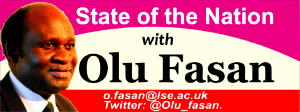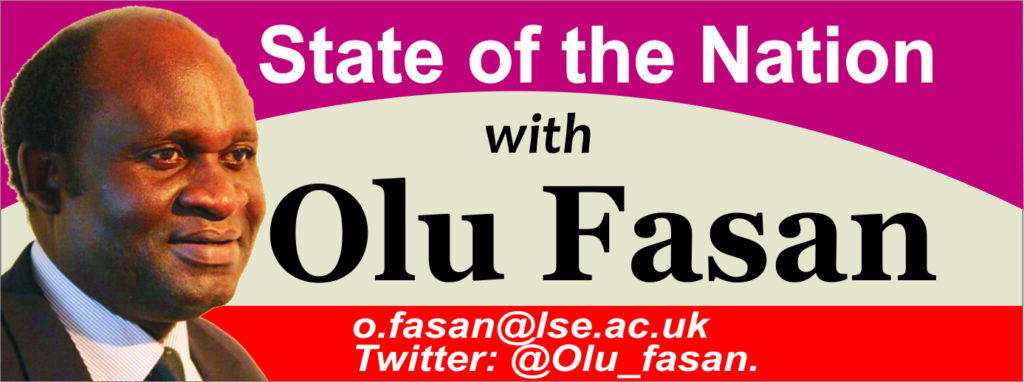

By Olu Fasan
RECENTLY, Babagana Kingibe, former Secretary to the Federal Government, made a powerful intervention on Nigeria’s unity. Speaking after receiving a ‘Lifetime Achievement Award’ from the Sun newspaper on October 16, Kingibe said: “A few of my colleagues believe that the unity of Nigeria is not negotiable. Of course, it is negotiable”, adding: “Even the constitution of husband and wife is negotiable”.
We know the “colleagues” Kingibe was referring to, don’t we? Chief among them is President Muhammadu Buhari, who always says “Nigeria’s unity is not negotiable”. Echoing his boss, the vice president, Yemi Osinbajo, often declares: “Nigeria is indissoluble”. That’s deeply unwise because no human association is non-negotiable or indissoluble.
But why is Kingibe wiser than his “colleagues”, the president and vice president? Well, a person’s worldview is intrinsic to his or her background, knowledge and exposure. Thus, the differences between Buhari, Osinbajo and Kingibe are akin to those between a soldier, a constitutional lawyer and a diplomat.
Take President Buhari. As a former combatant, he sees Nigeria’s unity through the prism of the civil war. He always reminds us that he fought in the war for “Nigeria’s unity”. Thus, for him, separatist agitation is an affront to the “unity” he fought a war for.
Perversely, he uses a sledgehammer to crack a nut by brutally repressing separatist agitators, who have no realistic means of achieving their goals! Kanu and Igboho are not Ojukwu, for God’s sake!
President Buhari’s fixation with the civil war is wholly misguided. Winning a war is one thing, win the peace is another. And it’s because Nigeria hasn’t won the peace since its civil war that there are secessionist agitations over fifty years after the war ended.
But winning the peace requires negotiations, it requires a post-war political settlement. The Roman emperor Augustus is most remembered not for winning wars, but for winning peace, for creating Pax Romana, Latin for Roman peace!
But Buhari, a war veteran, doesn’t know how to win peace. He hates negotiation, he detests dialogue. Rather, he’s holding Nigeria together with brutal military force. According to Amnesty International, the police and army have killed hundreds of Igbo youth.
But such heavy-handedness is counter-productive. As The Economist magazine noted in an article on Nigeria last week, the army “is pouring fuel on secessionist fires”, adding: “Ferocious security crackdown drive young men to join the rebels”. So, Buhari’s militaristic view of Nigeria’s unity is wrong-headed and not working.
What about Osinbajo’s legalistic approach? Being a constitutional lawyer, the vice president seemingly derives his view about Nigeria’s indissolubility from section 2(1) of the 1999 Constitution, which states: “Nigeria is one indivisible and indissoluble sovereign state”.
But stating in a constitution that a country is “indissoluble” is meaningless if the reality on the ground can’t sustain that seeming certitude. Many countries with such cast-iron provisions in their constitutions have fallen apart. See the “List of former sovereign states” in Wikipedia. It would be complacent to assume a Nigerian exceptionalism!
Besides, as Professor Osinbajo should know, Nigeria’s military-imposed constitution lacks the legitimacy to decree the country’s indivisibility and indissolubility. Such provisions would have greater weight and real legitimacy in a genuine people’s constitution, where the Preamble “We the People” is truthful, not fraudulent. That’s why Nigeria needs a brand-new constitution that’s inclusive, fair and just, and that creates a true federal system and addresses the country’s structural power imbalance.
Yet, despite his legalism and preachiness, Professor Osinbajo has never once talked about strengthening Nigeria’s fragile unity through negotiations. Recently, speaking to Nigerian diplomats in London, the vice president said: “Everywhere in the world today, people are coming together to form stronger units, they are not breaking up”, adding: “This is not the time to break up”.
But if people are “coming together to form stronger units”, how are they doing it? They are negotiating political and constitutional settlements.
The one painstakingly negotiated by Nigeria’s founding fathers was jettisoned by the military. Today, Nigeria operates a constitution imposed by the military, while the state ensures “unity” through military force. Yet, Nigeria can’t, for ever, be held together by fear or force.
Which brings us back to Kingibe. Why is his view on Nigeria’s unity different from that of Buhari and Osinbajo? Well, he is a seasoned diplomat who knows the power of negotiations in strengthening national unity.
As Nigeria’s ambassador to Greece and Cyrus and later to Pakistan, he saw how negotiations were key to dousing tensions, and, as the African Union’s special envoy to Sudan, he negotiated the Sudan/Southern Sudan problem.
So, as a renowned diplomat, not to mention also being a seasoned bureaucrat, it’s not surprising that, while Buhari is deploying soldiers to force Nigeria’s unity and while Osinbajo is being legalistic and preachy about Nigeria’s unity, Kingibe is wisely saying that Nigeria’s unity is negotiable and calling for negotiations to take place amicably.
Recently, former Vice President Atiku Abubakar, a seasoned politician and businessman, who knows that negotiation and dialogue are critical in politics and business, made similar interventions, saying: “Nigeria’s unity is negotiable”.
Speaking at a book launch in August, Atiku said: “I find it amusing when people declare Nigeria’s unity as fixed and non-negotiable”, adding: “You can’t declare your marriage as non-negotiable, while doing everything to sow seeds of discord in that same marriage”.
Interestingly, everyone uses the marriage analogy, but Nigeria’s was a “forced marriage”, consummated with brutality, hence it’s unstable. Professor Wole Soyinka recently told the Financial Times: “The British came and slapped some chunks together and said, ‘that’s yours’”. He argued that “secessionist impulse has always been part of Nigeria’s DNA”.
In 1953, Dr. Nnamdi Azikiwe urged the North to consider the consequences of seceding from Nigeria; today, Kingibe similarly warns those wanting to secede in the South to consider the implications.
Nothing has changed. Truth is, Nigeria can only perfect its imperfect union through negotiations.Which is why Nigeria’s unity is negotiable. The wise says so; the unwise misguidedly disagrees!
The post Kingibe’s wise thoughts on Nigeria’s unity appeared first on Vanguard News.
0 Commentaires